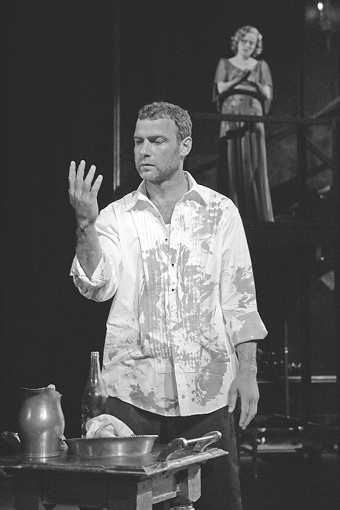The extremes of belief
Given the extent to which many of our contemporary political leaders, notably our president, claim to receive guidance and approbation from the realm of the supernatural, one could only wish that they evinced a shred of the questioning, doubt, or introspection of Macbeth. That is what makes the Scottish king human and prone to tragedy. This is the riveting subtext in the sumptuous yet intimate production of Shakespeare’s play getting a fantastic mounting in Central Park with a powerful and revelatory performance by Liev Schreiber in the title role. The sustained tension and dramatic irony of Moisés Kaufman’s production accepts that supernatural forces may not be wrong, but Macbeth’s demise is due to his egomaniacal misinterpretation of them. At the height of his power madness, Macbeth believes himself invincible because the Weird Sisters tell him he cannot be destroyed by “one of woman born.” Only then does he shed the insecurity that has wracked him—just to be cut down by Macduff, born, as it turns out, not technically by woman, but by C-section. Those pesky details get you every time.
As directed by Kaufman, Schreiber is the definitive Macbeth for our time. Lacking any real conviction or even passion to be king, he and Lady Macbeth (the sublime Jennifer Ehle) are nonetheless the consummate opportunists who once they see that supreme power is just a little murder away abandon all morality to achieve it. Power for power’s sake is the aim. After all, who doesn’t want really nice clothes and the ability to go to war on a whim to show who’s in charge? Schreiber exhibits a command of the stage that is truly extraordinary, and the dichotomy between the actor’s powerful stature and the character’s insipid vacillations is striking. Schreiber gives us a Macbeth so devoid of moral footing that he can be had and manipulated by his beliefs, by his wife, and by his lust for power.
Ehle is a wonderful Lady Macbeth. It is she who wants the power and works through her husband to get it. Unbridled by the doubts that slow Macbeth, she dives headlong into evil to achieve her ends. That it should lead her to madness is quaint by modern standards—today Lady Macbeth would probably turn into Ann Coulter and make millions—but Ehle abandons herself to the role and makes it rich and real.
Kaufman has staged the production with cinematic fluidity, which propels the action while maintaining absolute clarity of the narrative—no mean feat with Shakespeare’s epics. The exceptional design with sets by Derek McLane, costumes by Michael Krass, and lighting by David Lander would seem to set the production in the destabilized Europe of the 1940s, but despite Lady M’s magnificent clothes, the overall look of the show evokes a video game more than a movie; whether or not that was the intent, it’s brilliant. In video games, epic stories often combine with relentless mayhem to create a world of unending battles, persistent tension, and little—or short-lived—resolution. If only such things weren’t so real.
I would have thought the days of religious allegory were past. Perhaps in the Shakespearean sense they are, but in the rich, powerful, and timely new play “The Busy World is Hushed,” playwright Keith Bunin delivers a drawing room allegory that argues without being studied, presents symbolic characters without being stilted, and enlightens without being heavy handed. It’s a deeply felt, character-driven play that, as brought to life by the three-member cast under the near-perfect direction of Mark Brokaw, is a striking illumination of the struggle of faith in the modern world.
Hannah is an Episcopal bible scholar who hires Brandt to work with her on the interpretation of a recently found Gospel. Hannah is the kind of Episcopalian currently giving the Anglican Communion fits, as she is devout, while being willing to question her faith and open to new ideas. She believes that faith must continually be examined in the light of what we can know empirically. Brandt is a young man who is agnostic, going through a terrible time. His father is critically ill, and he is wrestling with his own homosexuality. Hannah hires Brandt, and suddenly her son, aptly named Thomas after the famous doubter, returns from the wilderness intent on imposing his non-belief on others. The dynamic of the believer, the questioner, and the rejecter sets the events of the play in motion and no one escapes unchanged. Yet Bunin suggests the only faith worth having—the only possible faith—is one that is challenged and challenging. Like the best sermons, the play doesn’t preach but is a catalyst for thought.
Jill Clayburgh as Hannah has a command of the character’s complex life and questing faith, and a consistently honest presence. Luke Macfarlane is amazing as Luke, who is energetic and charming but fully captures the mania of a life that has yet to be informed by any beliefs or structure. Between these two is Brandt, and as played by Hamish Linklater he is sympathetic and lost, sad but surviving. Linklater has a wide-eyed simplicity and vulnerability that can be quietly overwhelming, and the understated performance is in perfect synch with the two extremes of Hannah and Thomas.
Alan Moyer’s terrific set gave me flashbacks to the chambers of many Episcopal priests, but as familiar as that felt, the overall impact of the play is distinctly contemporary. Faith must be argued. It must be wrestled with. That’s evident in the Gospels, by the way. It is not answers but the search that lights the way to a more fully realized life—with faith or without it.
gaycitynews.com


































